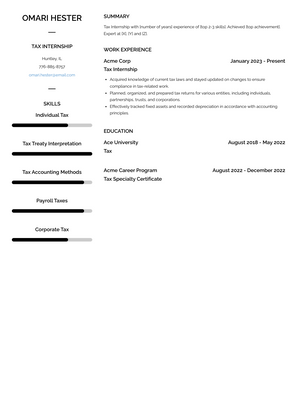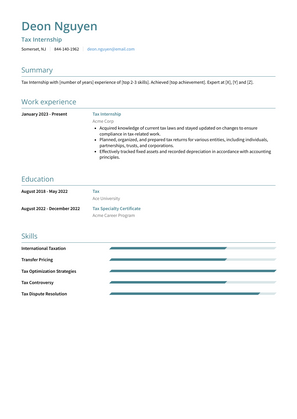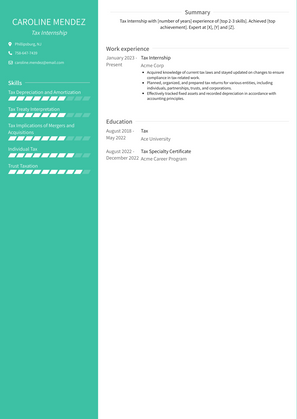Tax Internship Resume Examples and Templates
This page provides you with Tax Internship resume samples to use to create your own resume with our easy-to-use resume builder. Below you'll find our how-to section that will guide you through each section of a Tax Internship resume.



What Do Hiring Managers Look for in a Tax Internship Resume
- Exposure to tax compliance and regulations.
- Hands-on experience in tax preparation and analysis.
- Researching and interpreting tax laws and regulations.
- Familiarity with tax software and technology.
- Professional development in areas such as time management and communication skills.
How to Write a Tax Internship Resume?
To write a professional Tax Internship resume, follow these steps:
- Select the right Tax Internship resume template.
- Write a professional summary at the top explaining your Tax Internship’s experience and achievements.
- Follow the STAR method while writing your Tax Internship resume’s work experience. Show what you were responsible for and what you achieved as a Tax Intern.
- List your top Tax Internship skills in a separate skills section.
How to Write Your Tax Internship Resume Header?
Write the perfect Tax Internship resume header by:
- Adding your full name at the top of the header.
- Add a photo to your resume if you are applying for jobs outside of the US. For applying to jobs within the US, avoid adding photo to your resume header.
- Add your current Tax Internship job title to the header to show relevance.
- Add your current city, your phone number and a professional email address.
- Finally, add a link to your portfolio to the Tax Internship resume header. If there’s no portfolio link to add, consider adding a link to your LinkedIn profile instead.
Bad Tax Internship Resume Example - Header Section
Jonathon 696 Rock Maple St. South Lyon, MI 48178 Marital Status: Married, email: cooldude2022@gmail.com
Good Tax Internship Resume Example - Header Section
Jonathon Franklin, Lyon, MI, Phone number: +1-555-555-5555, Link: linkedin/in/johndoe
Make sure to add a professional looking email address while writing your resume header. Let’s assume your name is John Doe - here is a formula you can use to create email addresses:
- firstnamelastname@email.com - johndoe@email.com
- firstname.lastname@email.com - john.doe@email.com
- lastname.firstname@email.com - doe.john@email.com
- f.lastname@email.com - j.doe@email.com
- l.firstname@email.com - d.john@email.com
- firstnamelastname12@email.com - johndoe12@email.com
For a Tax Internship email, we recommend you either go with a custom domain name (john@johndoe.com) or select a very reputed email provider (Gmail or Outlook).
How to Write a Professional Tax Internship Resume Summary?
Use this template to write the best Tax Internship resume summary: Tax Internship with [number of years] experience of [top 2-3 skills]. Achieved [top achievement]. Expert at [X], [Y] and [Z].
How to Write a Tax Internship Resume Experience Section?
Here’s how you can write a job winning Tax Internship resume experience section:
- Write your Tax Internship work experience in a reverse chronological order.
- Use bullets instead of paragraphs to explain your Tax Internship work experience.
- While describing your work experience focus on highlighting what you did and the impact you made (you can use numbers to describe your success as a Tax Internship).
- Use action verbs in your bullet points.
Tax Internship Resume Example
Tax Internship
- Acquired knowledge of current tax laws and stayed updated on changes to ensure compliance in tax-related work.
- Planned, organized, and prepared tax returns for various entities, including individuals, partnerships, trusts, and corporations.
- Effectively tracked fixed assets and recorded depreciation in accordance with accounting principles.
Tax Internship Resume Example
- Conducted extensive research on recent tax legislation changes and their implications for corporate clients.
- Assisted senior tax professionals in analyzing complex tax issues and preparing memorandum outlining potential tax strategies.
- Collaborated with the team to develop innovative tax planning solutions for high-net-worth individuals, resulting in a 15% reduction in their overall tax liability.
- Prepared tax returns for individual clients, ensuring compliance with relevant tax laws and regulations.
- Updated and maintained tax databases and client files, improving data accuracy and accessibility.
Tax Internship Resume Example
- Assisted the tax compliance team in preparing federal and state income tax returns for the corporation, resulting in accurate and timely filing.
- Conducted thorough reviews of financial statements and supporting documents to identify potential tax issues and ensure compliance with tax regulations.
- Worked closely with cross-functional teams, including finance and legal departments, to gather necessary information for tax return preparation and resolve tax-related inquiries.
- Assisted in the preparation of sales and use tax returns, ensuring compliance with local tax laws and regulations.
- Conducted research on tax incentives and credits available to the company, resulting in the identification of $50,000 in potential tax savings.
-
Top Tax Internship Resume Skills for 2023
- Tax Compliance
- Tax Return Preparation
- Tax Research and Analysis
- Tax Planning and Strategy
- Tax Laws and Regulations
- Income Tax
- Sales and Use Tax
- Corporate Tax
- Individual Tax
- International Taxation
- Tax Accounting
- Tax Audits and Appeals
- Tax Software (e.g., TurboTax, TaxACT)
- Tax Forms and Schedules
- Tax Credits and Deductions
- Tax Exemptions
- Tax Treaties
- Tax Withholding
- Tax Compliance Reviews
- Tax Provisions and Deferred Taxes
- Transfer Pricing
- State and Local Tax (SALT)
- Research and Development (R&D) Tax Credits
- Tax Implications of Mergers and Acquisitions
- Tax Depreciation and Amortization
- Tax Basis Accounting
- Payroll Taxes
- Estate and Gift Tax
- Trust Taxation
- Excise Taxes
- Property Tax
- Tax Dispute Resolution
- Tax Fraud Prevention and Detection
- Tax Risk Management
- International Tax Compliance
- Tax Policy and Legislation
- IRS Rules and Procedures
- State and Local Tax Regulations
- Tax Treaty Interpretation
- Tax Impact Analysis
- Tax Optimization Strategies
- Tax Due Diligence
- Tax Accounting Methods
- Multistate Taxation
- Tax Provision Calculations
- Tax Reform Analysis
- Tax Controversy
- Tax Consulting
- Tax Research Databases
How Long Should my Tax Internship Resume be?
Your Tax Internship resume length should be less than one or two pages maximum. Unless you have more than 25 years of experience, any resume that’s more than two pages would appear to be too long and risk getting rejected.
On an average, for Tax Internship, we see most resumes have a length of 2. And, that’s why we advise you to keep the resume length appropriate to not get rejected.
What should I include in my objective statement on a tax internship resume?
Your objective statement should emphasize your educational background in accounting or finance, your enthusiasm for learning about tax processes, and your commitment to contributing to the firm or organization. For example: "Detail-oriented and motivated accounting student seeking a Tax Internship at [Company Name]. Eager to apply my knowledge in tax preparation, financial analysis, and compliance while gaining hands-on experience in a professional setting. Committed to contributing to the success of the tax team and developing a deep understanding of tax laws and regulations."
How can I highlight relevant skills on a tax internship resume if I have no direct experience?
If you lack direct experience, focus on transferable skills such as analytical thinking, attention to detail, and proficiency in accounting software like Excel, QuickBooks, or other financial tools. Highlight any relevant coursework in taxation, accounting, or finance, and emphasize your ability to work with numbers, analyze financial data, and follow complex regulations.
Should I include project work on my tax internship resume?
Yes, including project work is essential, especially if you have limited professional experience. Describe any academic or personal projects where you worked on tax-related assignments, such as preparing mock tax returns, analyzing tax data, or researching tax laws. Focus on your role, the methodologies you used, and the outcomes of your work.
How can I demonstrate my understanding of tax concepts on my resume?
To demonstrate your understanding of tax concepts, mention any relevant coursework or certifications, such as courses in federal taxation, state taxation, or corporate tax. Highlight your experience with tax preparation software, your ability to interpret tax codes, and your understanding of compliance requirements. If you have participated in any tax-related competitions or volunteer programs, be sure to include those as well.
What should I include in the education section of my tax internship resume?
Include your current academic status, such as your pursuit of a Bachelor’s or Master’s degree in Accounting, Finance, or a related field. List any relevant courses you have completed, such as Taxation, Financial Accounting, or Business Law. Mention any academic achievements, such as a high GPA or involvement in accounting clubs or organizations.
Can I include non-tax work experience on my tax internship resume?
Absolutely. Non-tax work experience can be valuable, especially if it demonstrates skills such as analytical thinking, attention to detail, or customer service. For example, roles in retail, data entry, or any job that involved handling financial information or working with customers can provide relevant experience for a tax internship position.
How do I format a tax internship resume with no experience?
Use a clean and professional format with sections for your objective, skills, education, and experience. Start with a strong objective statement that outlines your enthusiasm for the role. Then, list your technical skills and any experience, including coursework, projects, or part-time jobs, that demonstrate your ability to handle the responsibilities of a tax intern. Highlight any certifications or training that support your qualifications.
How important is a cover letter when applying for a tax internship with no experience?
A cover letter is very important as it allows you to explain your interest in tax accounting and why you’re a great fit for the internship, even without direct experience. Use the cover letter to highlight your analytical skills, attention to detail, and any relevant projects or coursework. Tailoring your cover letter to the specific firm or organization and the type of tax work they focus on can help make a strong impression.
How can I make my tax internship resume stand out with no experience?
To make your resume stand out, focus on your academic achievements, any relevant coursework, and project work that demonstrates your understanding of tax concepts. Highlight your attention to detail, proficiency with accounting software, and commitment to learning about the tax field. Tailoring your resume to the specific needs of the firm or organization can also help you differentiate yourself from other candidates.
-
What should I include in my objective statement on a tax internship resume?
-
How can I highlight relevant skills on a tax internship resume if I have no direct experience?
-
How can I demonstrate my understanding of tax concepts on my resume?
-
What should I include in the education section of my tax internship resume?
-
Can I include non-tax work experience on my tax internship resume?
-
How important is a cover letter when applying for a tax internship with no experience?
-
How can I make my tax internship resume stand out with no experience?
Copyright ©2025 Workstory Inc.
